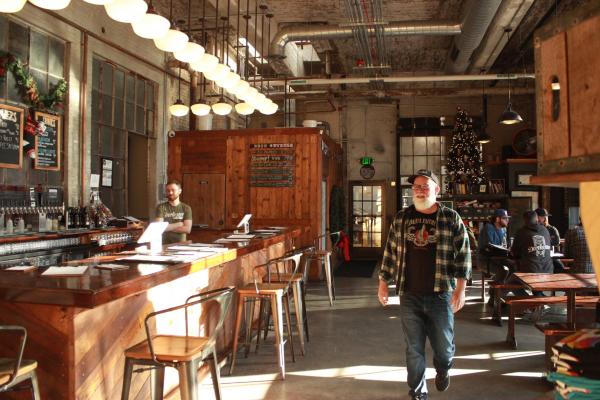October 13, 2020

Dorchester Brewing Company co-founder and CEO Matt Malloy, right, was shown in the brewery’s Massachusetts Avenue space last winter, before the Covid-19 crisis. Katie Trojano photo
For some, the coronavirus was supposed to fade before winter came around again. Or was it?
The reality is that no one knew what to expect, so Dorchester restaurant and bar owners made accommodations for the virus as best they could with the little information they had: They implemented outdoor dining, reduced indoor capacity, put up plastic partitions, and added takeout options.
But this is New England. Patios lose their cache as the temperatures drop, and restaurants have never before faced an imperative to force outdoor dining beyond what’s comfortable.
This year, the City of Boston extended the outdoor dining season from Oct. 31, the usual closing date, to Dec. 1. But making it comfortable to eat outside in November is complicated.
Matt Malloy, an owner and the CEO of Dorchester Brewing Company, says his establishment’s spacious outdoor seating areas — at the street level and on the rooftop — have helped the brewery continue to serve patrons and employ its workers throughout the pandemic.
For a while, Dorchester Brewing installed tents on the rooftop to provide a more comfortable experience for diners, but they were told to disassemble them because they were in violation of zoning code. Now, Malloy is working with a manufacturer to make custom tents that align with city code (they will be able to handle snow build-up, for example) at a price tag approaching $150,000. And that’s before the infrared heating system is installed by a licensed electrician, which will push the total bill closer to $200,000.
Meanwhile, business is down significantly this year: the establishment has experienced fewer patrons, and can’t make up for it by holding events or weddings as was the case in previous years.
“This isn’t going away, it’s going to be like this for years. Winter is going to be devastating,” said Malloy. “We’re not trying to make money. We’re trying to survive.”
Indoors, the Brewery has removed tables to accommodate social distancing. But the remaining tables are unnecessarily big for the largest allowable parties — currently still at six — so Malloy is working with a local craftsman to build smaller custom tables that will help maximize the available indoor space while keeping patrons safely separated — that carries a five-digit price tag.
Bar seating is now permissible, but the continuing limits make it less than appealing. Bar staff and other patrons must be six feet away from seated drinkers, and plastic partitions are required to divide parties and staff.
“We have the space, but nobody wants that experience, so we’re not doing it,” said Malloy.
Despite the obstacles, Malloy remains optimistic. He has a good relationship with the city licensing board and says they’ve been nothing but supportive, showing that they fundamentally care about restaurants and their people.
“They’re learning as we’re learning,” said Malloy. “We’re all rolling with the punches together.”
Under the city’s Reopen Boston Fund, restaurants looking to seat and serve outdoors past Oct. 31 can apply for debt-free grants to cover the costs of equipment like heaters, propane, outdoor seating, and more.
“As we head into the cooler months, we want to support the restaurants and businesses that bring so much to our neighborhoods,” Mayor Marty Walsh said in a statement. “Restaurants have continued to face incredible challenges during this pandemic, and we remain committed to supporting them, whether it’s through expanded outdoor dining or additional funding.”
But even an extra infusion of cash might not be enough for some businesses. Graham Reed is vice president of Sunglow Industries, an East Coast distributor of commercial patio heaters. He said the demand for their products is much higher than in previous years, which has resulted in a significant backlog. They’re seeing three-plus month backorders on propane heaters, putting the next available supply well into December.
“Under normal circumstances, restaurants trying to plan for outdoor dining should be finishing up right about now,” said Reed. “Restaurants that aren’t used to outdoor dining are behind the eight-ball. I can’t imagine the financial strain these restaurants are under. Having to spend money on additional supplies for accommodating guests outside has to be very nerve-racking. If you build it, will they come?”
Still, the team at Dorchester Brewing is soldiering on, keeping their employees and the neighborhood front-and-center. All of the $338,000 the restaurant received through the paycheck protection program — and more from the restaurant itself — went to its 50 employees, ensuring that no one was furloughed or had hours reduced.
“First and foremost, we want to do right for our community,” said Malloy. “Many of our employees live here in Dorchester and walk to the brewery.”
What they ask from the community in return is twofold: patience and patronage. They’ve had more than a few clashes with patrons who feel their rights are being infringed upon and take their frustrations out on the bar staff.
“There’s a lot of emotion right now. It comes out in different ways with people at different times. I feel for people, these are tough times,” said Malloy. “Please understand that we are doing our absolute best to accommodate the changes needed.”
“The next 6-12 months are going to be rough,” he said. “If you want to help, now more than ever, shop locally.”


